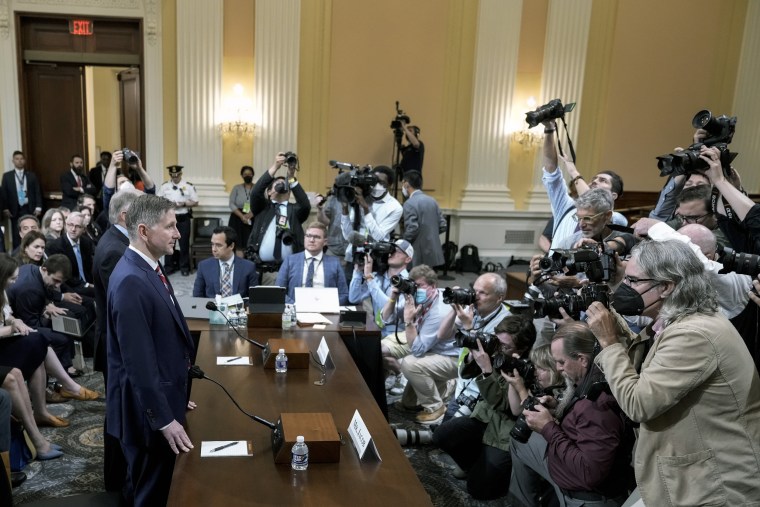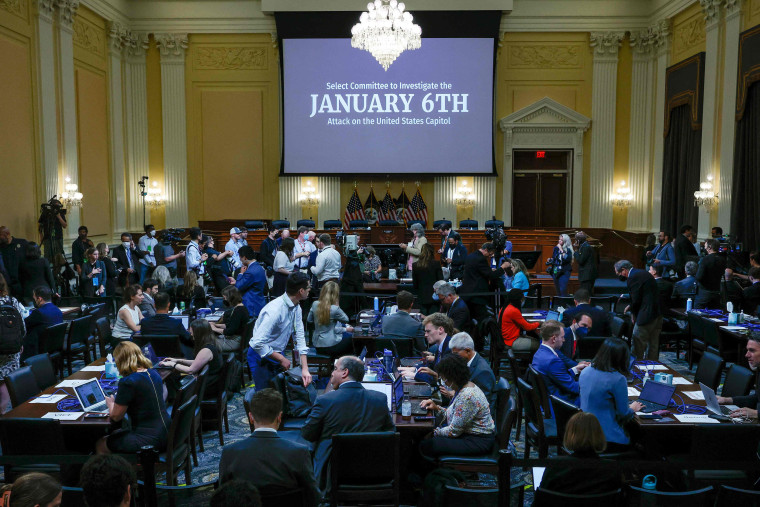WASHINGTON — Thrust into a pivotal role for democracy, former Vice President Mike Pence chose the Constitution over then-President Donald Trump on Jan. 6, 2021, according to the House committee investigating the insurrection at the Capitol that day.
In evocative detail Thursday, the panel and its witnesses described how Trump applied blistering public and private pressure to try to stop Pence from certifying the 2020 election results. Even after Trump's own legal adviser admitted before him the plan wasn't legal, he cranked up the pressure.
The effort culminated in a “heated” call between the two men the morning of Jan. 6 and in an insurrection later that day that put Pence, and, the panel argued, American democracy, in mortal danger.
Pence withstood it all.
By performing one of the few enumerated constitutional duties of a vice president — overseeing the counting of electoral votes in a joint session Congress — he demonstrated that the guardrails of the republic sometimes narrow to the width of one man. Pence became just that man by refusing to cave in the face of condemnation and violence, committee members said.
“Donald Trump wanted Mike Pence to do something no other vice president has ever done: the former president wanted Pence to reject the votes and either declare Trump the winner or send the votes back to the states to be counted again,” panel Chairman Bennie Thompson, D-Miss., said before casting Pence, his longtime political adversary, in the role of democracy’s champion.
“Mike Pence said no,” Thompson continued. “He resisted the pressure. He knew it was illegal. He knew it was wrong.”

Though Trump is the focal point of the committee’s investigation, Pence emerged as the central figure in Thursday’s hearing. The Democratic-dominated panel lauded him in absentia, turning the conservative stalwart — who is widely expected to run for president in 2024 — into an unlikely hero for their partisans.
Though outlines of Pence’s story were already known, it is a central component of the committee’s goals to prove that Trump pursued illegal and anti-democratic means to remain in power. Moreover, the panel contends that Trump knew — or at least had been advised — that he lost the election, that he could not overturn the results through legal means, and that Pence had no constitutional authority to interfere with the electoral count.
None of that stopped Trump from trying to hold power, or ultimately from targeting Pence as a turncoat.
In the weeks following the 2020 election, as Trump looked for ways to reverse the outcome, lawyer John Eastman began promoting a plan to have Pence refuse to certify electors. Trump became enamored of the idea, even though White House lawyers — and Eastman himself — advised Trump that it was bunk, according to witnesses who testified before the Jan. 6 panel.
Pence counsel Greg Jacob and former Circuit Court Judge J. Michael Luttig appeared before the committee Thursday, joining a handful of witnesses whose testimony was recorded on previous dates.
Jacob said that Eastman told Trump the plan was not legal on Jan. 4. Days later, Eastman still advocated Pence execute on it, Jacob said.
In another clip, Eric Herschmann, a Trump White House lawyer, said he had discussed with Eastman the potential dangers of the plan.
“I said, ‘You’re going to cause riots in the streets,’” Herschmann recalled. “And he said words to the effect of, ‘There’s been violence in the history of our country, Eric, in order to protect the democracy or protect the republic.’”
Indeed, violence was discussed, anticipated and threatened by both proponents and opponents of Eastman’s plan for Pence to steal the election, according to witness testimony.
As Pence prepared a public statement explaining why he would certify the electoral votes, Jacob testified, the vice president focused on what he viewed as his duty to the Constitution and the American public.
“The vice president said, ‘This may be the most important thing I ever say,’” Jacob said in recorded testimony.
During Thursday's hearing, Jacob testified that it was Pence’s “first instinct” to reject the idea that one man — the vice president — could overturn the will of voters when he was first apprised of the concept in early December 2020.
In the final days and hours before the electoral vote count, when Trump had exhausted alternative remedies, the president ramped up pressure on Pence. That included berating Pence during a phone call on the morning of Jan. 6.
Furious that his vice president still intended to defy him, Trump called Pence “the ‘p’ word,” according to recorded testimony from Julie Radford, a former chief of staff to Ivanka Trump.
The younger Trump was one of several family members and top aides who were present in the Oval Office with Trump during the call. Pence was about two miles away at the vice president’s residence at the U.S. Naval Observatory. In her own testimony, Ivanka Trump said the discussion became “pretty heated” and that her father used a “different tone” than he had with Pence in the past.
That was hardly the end of it, though. Moments later, at a “Stop the Steal” rally, Trump repeatedly urged Pence to interfere with the electoral vote count and then told his supporters to march on the Capitol. As the committee has previously noted, members of right-wing extremist groups were already at the Capitol.
Had Pence obeyed Trump’s order, that would have “plunged America into what I believe would have been tantamount to a revolution within a constitutional crisis,” Luttig, a leading conservative legal scholar, said under questioning from Rep. Liz Cheney, R-Wyo., the vice-chair of the committee.

That, Luttig said, “would have been the first constitutional crisis since the founding of the republic.”
Pence stood his ground, but the ballot-counting procedure was disrupted when Trump supporters attacked the Capitol.
Inside the building, Pence narrowly avoided a confrontation with rioters, some of whom were calling for him to be hanged for disloyalty to Trump. They got within 40 feet of the man first in line to the presidency. But even when it was clear that Pence’s safety was at risk, Trump chided his vice president.
“He [Trump] knew that there was violence and he still tweeted the vice president didn’t have the courage to do what was necessary,” Rep. Pete Aguilar, D-Calif., a member of the committee who will take a prominent role in Thursday's hearing, told NBC News in an exclusive interview.
While Pence has become reviled by Trump’s political base, he has sought to capitalize on his Jan. 6 actions in building a possible presidential campaign. He has visited the early voting states of Iowa and New Hampshire and has challenged Trump in public remarks.
In a February speech to the conservative Federalist Society in Orlando, Pence delivered a concise analysis.
“I heard this week that President Trump said I had the right to overturn the election,” Pence said. “President Trump is wrong.”
The hearing Thursday was the third of the committee’s seven planned public sessions.
